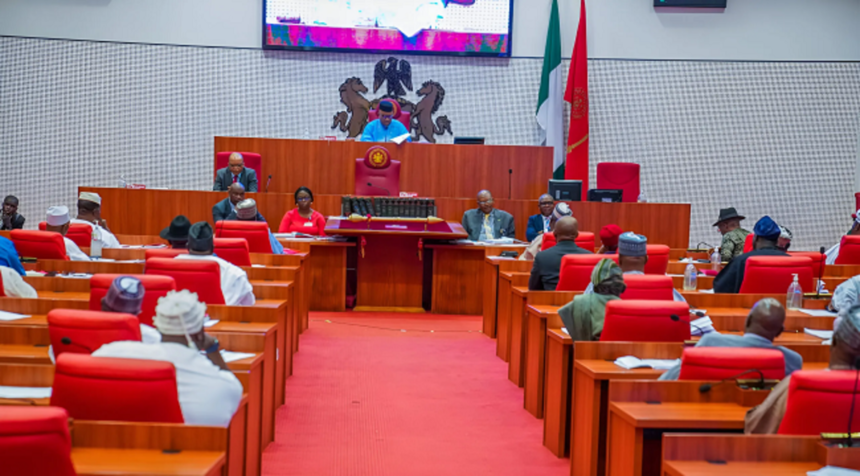
Critical stakeholders in the health sector on Thursday expressed divergent views on the move by the Senate to establish a National Agency for Malaria Eradication.
The stakeholders disagreed in Abuja during a public hearing on the bill sponsored by Senator Neda Nwoko (APC, Delta-North), seeking to establish the agency.
Nigeria is rated to have the highest annual malaria deaths globally, accounting for approximately 31% of all malaria deaths worldwide in 2023.
ALSO READ: Kogi: 12 deaths recorded as 40,678 children affected by malaria in 2024
World Health Organisation (WHO) figures indicate that out of an estimated 597,000 global malaria deaths recorded in 2023, Nigeria alone contributed about 185,000 deaths, making it the leading country in malaria mortality.
The country that came closest to Nigeria on the chart was the Democratic Republic of the Congo, with about 12% of malaria deaths as of 2023.
The need to strengthen eradication efforts was mainly the push behind the bill, but stakeholders failed to reach a consensus on the necessity for the proposed agency.
First to kick against establishing a fresh agency for the eradication of Malaria in Nigeria was the Chief State Counsel in the Federal Ministry of Justice, Imarha Reuben. He argued that creating such an agency would be a duplication of already existing ones and run contrary to the implementation of Steve Orosanye’s report on the realignment of public agencies and parastatals.
He told the session, “The Federal Ministry of Justice is against the National Agency for Malaria Eradication (Establishment) Bill 2025, SB 172, to avoid a duplication of functions of existing similar agencies in line with implementation of the Orosanye report.”
Nigerian Tribune recalls that the Oronsaye Report, commissioned by the administration of former President Goodluck Jonathan in 2012 and led by Stephen Oronsaye, was a comprehensive 800-page document focused on rationalising and restructuring the Nigerian federal civil service to tackle duplication, inefficiencies, and reduce government costs.
Among others, it recommended reduction and consolidation of government agencies.
For instance, out of 541 federal agencies, parastatals, and commissions, the report recommended scrapping or merging 220 entities.
Specifically, it proposed reducing statutory agencies from 263 to 161 by abolishing 38, merging 52, and reverting 14 back to ministries as departments.
One major benefit envisaged by the report was cost saving in the running of government business. If implemented, the report projected savings of over N862 billion between 2012 and 2015 by cutting unnecessary agencies and discontinuing government funding for professional bodies and councils.
Incidentally, Jonathan, who commissioned the report, did not implement it. Successive administrations after Jonathan’s -Muhammadu Buhari’s and Bola Tinubu’s -have also not been able to fully implement it.
Also kicking against the proposed agency, the Chairman, Malaria Technical Working Group in Nigeria, Dr Kolawole Maxwel, argued that rather than establishing an eradication agency, government at all levels in the country should come up with concerted efforts for the total elimination of Malaria.
He recommended, “We recommend that the current eradication target should be changed to elimination.
“We are also suggesting that the malaria programme should be housed within a coordinated government structure to avoid fragmentation and for easy coordination.
“If malaria is taken out as an agency, it leads to another fragmentation of the health sector.”
A representative of the National Agency for Food and Drug Administration and Control (NAFDAC), Fraden Bitrus, suggested that concerted efforts towards eradication of Malaria needed to be strengthened, but they should not involve the creation of a new agency.
But, the President of Environmental Health Officers Association, FCT Chapter, Ismaila Haruna Dankogi, backed the move for the establishment of the proposed agency.
According to him, the proposed agency will help the country to change its approach to dealing with malaria from a curative to a preventive one.
Also speaking, the Executive Director of Community Vision Initiative, Dr Chioma Amajoh, strongly supported the move for establishment of the agency.
Explaining her stance, she said it would serve as a required springboard for coordinated actions against Malaria.
Dr Amajoh, who is fondly called ‘Mama Malaria’, passionately appealed to the committee to allow the proposal to see the light of day, adding, “Clinical case management of Malaria in Nigeria over the decades, has failed to tame the scourge.”
President of the Senate, Godswill Akpabio, in a remark to open to hearing, noted, “It is time to move from seasonal campaigns to institutionalized eradication, backed by law, science, and accountability.”
Senator Ipalibo Banigo (Rivers-West), who chaired the session, thanked all the stakeholders for their inputs into the proposed legislation, assuring them that the Senate would do justice to their contributions.
WATCH TOP VIDEOS FROM NIGERIAN TRIBUNE TV
- Let’s Talk About SELF-AWARENESS
- Is Your Confidence Mistaken for Pride? Let’s talk about it
- Is Etiquette About Perfection…Or Just Not Being Rude?
- Top Psychologist Reveal 3 Signs You’re Struggling With Imposter Syndrome
- Do You Pick Up Work-Related Calls at Midnight or Never? Let’s Talk About Boundaries






